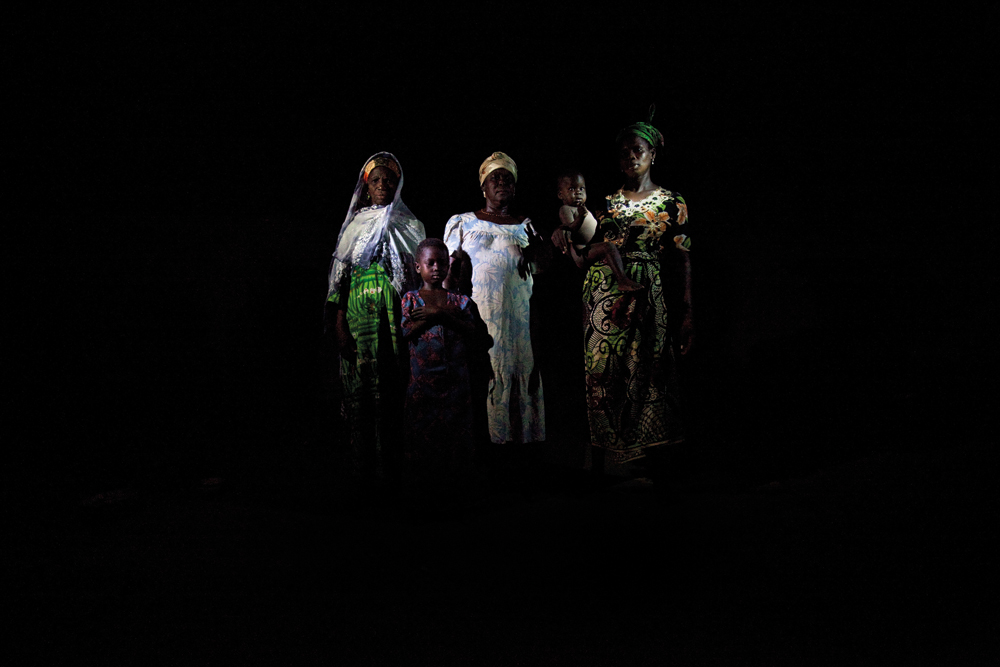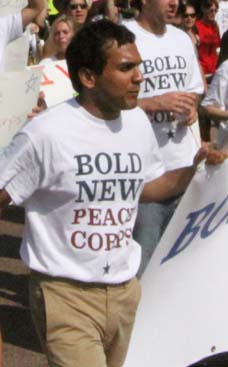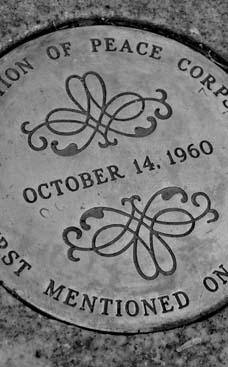
"A lot of the imagery you see coming out of Africa has been very victimising," says Peter DiCampo, the winner of BJP's 2010 International Photography Award for his Flashlight Portraits series. "But in these images, you see strong and happy people. It's not a ‘poor Africa story'. We see a lot of stories about poverty, but there isn't a lot of context about why this poverty exists. Providing that context is important." Fresh from university following an internship at VII Photo in Paris, DiCampo joined the US Peace Corps for a two-year stint in the west African state. "I thought it was the best way to discover a community, to really go in-depth," he says. "You're sent into one place on your own for two years, working among the people, learning the language. I wanted to live abroad and the Peace Corps was the best way to do it without spending a lot of money." Of course, he tells BJP, his first goal was to help people through volunteer work, but he also wanted to improve his photography. "People learn about photography in different ways. Through the Peace Corps, I thought I would have a chance to experiment more, do my own thing and learn the way I wanted to." It's not just a story about the lack of electricity, he says. It's more about the effect that has on daily life; the way it prohibits development. "Students can't study in the evenings. There is no real hospital, because you can't refrigerate the medicine. You can't attract teachers, because they prefer to stay in cities where there is electricity. And you can't operate machinery. It has a great social and economic impact," DiCampo says.
Ghana RPCV Peter DiCampo sheds a little light on the communities that make their home there without electricity in his Flashlight Portraits, which won the International Photography Award 2010 run by BJP
Living in the Dark
Caption: Members of the Abubakari household pose in Voggu, Northern Region, Ghana, where Peter DiCampo photographed them for his Flashlight Portraits, the winning portfolio in BJP's International Photography Award 2010. They are among the 1.6 billion people worldwide who live without electricity. Image © Peter DiCampo/VII Mentor Program
For the rural villagers of northern Ghana living close to the equator, each 12-hour day ends with a 12-hour night of near-total darkness. Peter DiCampo sheds a little light on the communities that make their home there without electricity in his Flashlight Portraits, which won the International Photography Award 2010 run by BJP.
Author: Olivier Laurent
25 Jan 2011 Tags: Vii
"A lot of the imagery you see coming out of Africa has been very victimising," says Peter DiCampo, the winner of BJP's 2010 International Photography Award for his Flashlight Portraits series. "But in these images, you see strong and happy people. It's not a ‘poor Africa story'. We see a lot of stories about poverty, but there isn't a lot of context about why this poverty exists. Providing that context is important."
The series is part of longer-term project, Life Without Lights, which looks at the social and economic impact of a lack of electricity on populations around the world.
The American photographer had not anticipated documenting this problem when, four years ago, he first flew to Ghana.
Fresh from university following an internship at VII Photo in Paris, DiCampo joined the US Peace Corps for a two-year stint in the west African state.
"I thought it was the best way to discover a community, to really go in-depth," he says. "You're sent into one place on your own for two years, working among the people, learning the language. I wanted to live abroad and the Peace Corps was the best way to do it without spending a lot of money."
Of course, he tells BJP, his first goal was to help people through volunteer work, but he also wanted to improve his photography.
"People learn about photography in different ways. Through the Peace Corps, I thought I would have a chance to experiment more, do my own thing and learn the way I wanted to."
DiCampo's first project was about his Peace Corps work in the small village of Wantugu in Ghana, where Dracunculiasis was widespread. Dracunculiasis is more commonly known as the Guinea worm disease, which is a parasite that spreads through contaminated water and forms a worm that can measure up to one metre in length. Once it is fully formed, the worm bursts slowly through the skin – requiring a painful two-week-long removal process.
When he arrived in Wantugu, it was the second-highest endemic village in the country. "There was already a team of local people working to eradicate it," he says. "I helped organise them; I would run an education programme and photograph it, too."
Life Without Lights only happened later, when there was a lull in volunteer work, says DiCampo. "I happened to be hanging out at night and saw in my head images I could be making. And then I just picked up my camera."
It's not just a story about the lack of electricity, he says. It's more about the effect that has on daily life; the way it prohibits development.
"Students can't study in the evenings. There is no real hospital, because you can't refrigerate the medicine. You can't attract teachers, because they prefer to stay in cities where there is electricity. And you can't operate machinery. It has a great social and economic impact," DiCampo says.
Ghana doesn't suffer from a shortage in electricity. On the contrary, most years it exports a surplus to neighbouring countries. What Ghana lacks is a comprehensive network to connect all cities and villages.
In Wantugu, the electricity poles were first set up in 2000, just before general elections, but the power lines weren't put into operation. In 2004, before the following elections, local politicians promised that the village would finally be connected, but to no avail. They made the same promise four years later, once again just before elections.
While DiCampo had no trouble representing life without electricity, he started to realise that his work lacked faces and, consequently, emotions. "Because my images were shot in darkness, we could only see silhouettes and shadows. I needed a way to personalise it a bit more," he says. "That's when the idea for Flashlight Portraits came about."
The idea of using flashlights came to him early on, but he didn't put it into practice straight away. "I started shooting this way only after two teenagers asked that I take pictures of them. I told them that it was too dark, and that's when they grabbed their friends who used the flashlights on them," says DiCampo. "When I realised how much they liked [the pictures], I started doing it more often. I would ask kids to hold the flashlights. Now, it has become everyone's favourite part of my shoots."
But, he admits, at the time, he was still learning. "I did it in a very brief way and moved on," he tells BJP. "But then, everyone kept on pushing me to continue on that project – so I've been back several times since [shooting most of pictures shown here from Flashlight Portraits in another village, Voggu, in northern Ghana]."
In fact, Life Without Lights and his Flashlight Portraits series have become a multi-part, long-term project. He's taken the concept to villages in Kurdistan in Iraq and Pajarito Mesa, just outside Albuquerque, New Mexico in the US. "I might not always shoot at night," he says, "but I know that I'll continue to shoot these portraits."
Funding gap
Now the only thing he's missing, he tells BJP, is funding to continue the work. "I sell it bit by bit," he says. "My Ghana work sold in the US and two other countries, but I also work with NGOs and the Peace Corps to fund some of my trips." DiCampo is also shooting video while on assignment. For the Ghana part of his Life Without Lights project, he produced a five-minute multimedia presentation that has been shown at Visa Pour l'Image and the Ottawa Photography Festival, and published online by MSNBC.com.
Already, the work has brought attention to the 26-year-old photographer. He has received a grant from the Pulitzer Center on Crisis Reporting and was a finalist for the Open Society Institute's Documentary Photography Distribution Grant. In June he joined the VII Mentor programme. John Stanmeyer, a full member of the co-operatively run agency, has taken him under his wing for two years, and VII distributes his work – both old and new.
"I've known John for several years now," says DiCampo, "ever since I interned with VII in Paris. He gave me great advice on this story." And will continue to do so, as DiCampo moves off-grid towards another community lacking electricity. But he's not putting Ghana behind him. With Wantugu now finally connected to the electricity network, DiCampo has been back to record how life in the village has changed since then. "Some street vendors tell me that their sales have tripled now that they can sell cold drinks."
Visit www.peterdicampo.com and www.viiphoto.com















